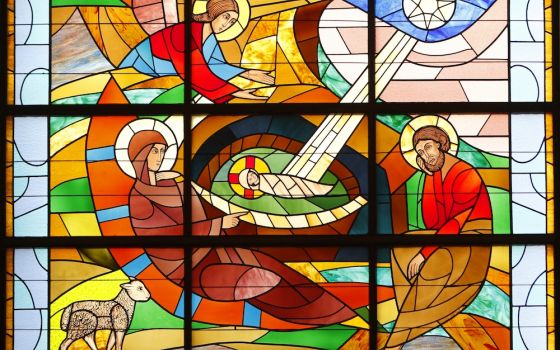Zena Grazioli, left, works with other women in the garden of the Nomadelfia Catholic community in Rome Feb. 21, 2017. Families in the community seek to embrace the lifestyle of New-Testament-era Christians by living together and sharing domestic responsibilities. (CNS photo/Paul Haring)
Editor's Note: For the 2021 Advent season, EarthBeat is revisiting and republishing some of the reflections from last year's series, "Simple Advent, Abundant Life." Sign up here to receive the "Simple Advent Revisited" reflections three times a week in your inbox.
Fourth week of Advent—Reflection
Monday, Dec. 20
REFLECT
All who believed were together and had all things in common; they would sell their possessions and goods and distribute the proceeds to all, as any had need. Day by day, as they spent much time together in the temple, they broke bread at home and ate their food with glad and generous hearts, praising God and having the goodwill of all the people.
- Acts 2: 44-47
Environmentalist Bill McKibben last year wrote about a study that found in 2020 the amount of human-made materials on the Earth weighs more than all natural life. While we live in a time in which we have access to more material goods than any other humans throughout history, income inequality is stark. As some people drown in stuff and suffer from what has been called "affluenza," a majority of the world's population struggles to meet basic needs.
We do not have to live with this level of disparity in the world. The earth's gifts abound and are plentiful enough to feed everyone, a lesson shared in the book of Genesis, as long as people don't take more than they need.
Early Christians show us a model of how community can bring about true abundance. Instead of each person trying to meet their own needs, resources were shared so that no one lacked what was required to flourish. What was unnecessary was sold, meals were shared and the people loved each other. This is not meant to romanticize this time period — life in first century Palestine was far from easy, but the people knew that they survived through times that were bountiful and times that were hard in community.
While it might feel impractical or impossible to go back to this way of living, we see modern examples of this life in contemporary religious orders, and in alternative economies, such as the gift economy, where goods and services are not traded or sold but given without expectation of a future return. We might have felt isolated at times from other members of our community during the pandemic, but just like the early Christians, we can support one another, especially at this unprecedented time in history.
What is one way that the early Christian communities can be a model for your own life to live more simply? How can community provide abundance this Advent?
Consider: Do you have neighbors with whom you can share things like appliances or tools so that you don’t need to buy your own? Is there a local time bank or babysitting co-op that you could explore? A food co-op or community kitchen where people can share food with neighbors?
ACT
Visit the Advent Simplicity Calendar to learn more about gift economies.
Simple Advent, Abundant Life
reflect | act
Sign up to receive daily emails for this Advent reflection series.
Advertisement







